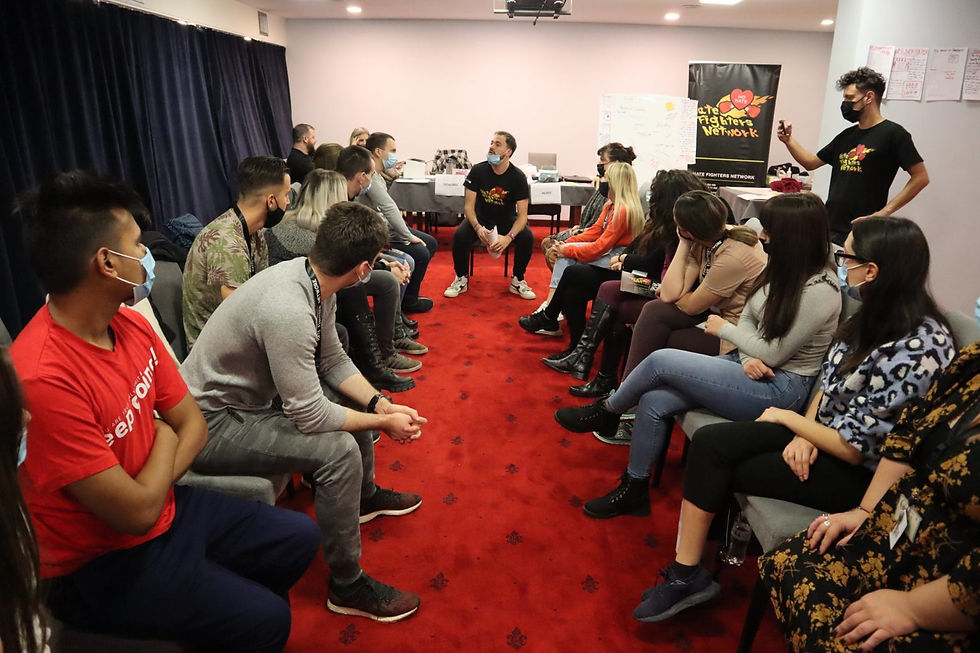The journey of EU Youth Zone
- project4corg
- Jul 25, 2022
- 3 min read
Updated: Nov 29, 2023
The project “EU Youth Zone” was to motivate young people from 7 European countries (Serbia, Italy, Greece, Albania, Lithuania, Bosnia and Herzegovina and North Macedonia), to think critically about the reality of the European Union, and express their thoughts in order to offer constructive criticism, so that EU will evolve towards a friendly future for European youth. Moreover, through the events implemented, young people from the participating countries will get the chance to learn about EU values, get familiar with European citizenship and evaluate the policies of EU in general, and also in the context of COVID-19, to express if the policies followed, where aligned with European values, such as solidarity, equality, respect, for all of Europe.
Now, about the practical part of the project.
A preparatory meeting was organised in Corfu, Greece from 03.06. to 06.06.2021, involving 16 participants. The meeting was held among nationals from the 7 partner countries in order to discuss operational and financial matters of the project, such as project details, decisions regarding the project such as work plans, content, planning of the activities, target groups, mutual obligations and responsibilities, evaluation and reporting.

The end of this meeting led to 7 phases of events that provided people with interesting and unique experiences and led to the desired outcome. Most of the events were held simultaneously in each country during a specific period of time, so that the young people will be able to discuss their ideas and thoughts with their fellow people. However, there were events that required the gathering of participants of the partner nationalities at a European city.
Let's see:
The 1st event was comparted of national level events that took place in the period from 01/07/2021 to 30/09/2021. The aim was to provide a platform to young people at their respective countries, so they can open the dialogue about the European Union, its latest policies and how they affect them, as well as things they would like to see changed in the future. The outcome of these conversations was combined into documents and sent to various European Institutions to review.
The 2nd event “Training – debating Euroscepticism” took place in Sarajevo, Bosnia and Herzegovina, from 11/10/2021 to 16/10/2021. This time, there was an educative character in order to provide youngsters with the appropriate tools and knowledge, to cultivate the feeling of community between EU and non-EU countries and form the sense of European citizenship

The 3rd event was held from 01/11/2021 to 28/02/2022. The focus of this event was to reach the local communities and provide knowledge of European citizenship and EU goals. At the same time it offered a space for debate and enhancement of knowledge among the young peoples’ ethnic groups.
The 4th event “EU Youth Quiz - Collecting materials and ideas for the development of the mobile phone application” was implemented 01/11/2021 to 31/01/2022. Through the meetings and the activities, the participants were provided with the basic knowledge for the EU. These materials were later used to create an educational quiz app, that aims to spread awareness for European citizenship and the role of the EU.
The 5th event “Youth meeting – Testing of the developed mobile phone application” was held in Corato, Italy, from 09/04/2022 to 13/04/2022. The objective was to finalise and test the EU quiz app, as well as add more information concerning the EU.

The 6th event “Launching of the EU Youth Quiz” from 20/04/2022 to 30/06/2022, was a promotional event, in order to launch the quiz application and spread the word across the local communities, so that schools and other educational institutions will use this tool to spread knowledge about EU.
The 7th and final event “Final conference” from 07/06/2022 to 11/06/2022, ended a year-long partnership in Nis, Serbia. It led to a European Karl Popper debate for EU related discussions and promoted the further engagement with the project for relevant local and European institutions.

“Eu Youth Zone” was an educational journey. It impacted thousands of people, mobilised local communities across the 7 partner countries and aided in meaningful connections between people of all ages. But most importantly, it led to the spread of information about the European Union, its values, its policies and the true meaning of European citizenship, a term that wasn’t widely used across Europe. The aftermath of the conferences and the debates was a sincere criticism of EU policies, through the eyes of people from different backgrounds and nationalities, in the light of bringing the EU policies closer to the diversity of populations. Also, we should not forget the creation of the EU quiz application, that will be used as an educational material and further spread knowledge about the EU in a fun and interactive way.



Comments